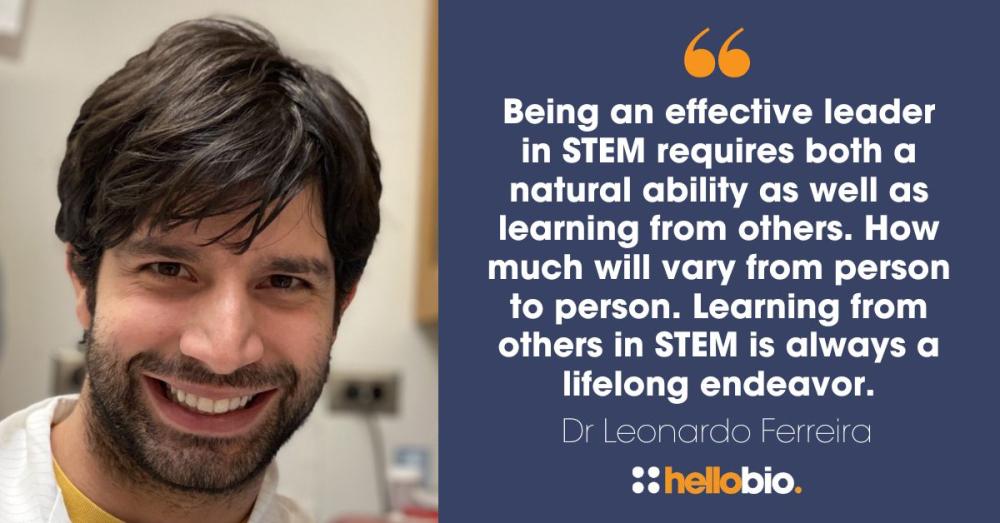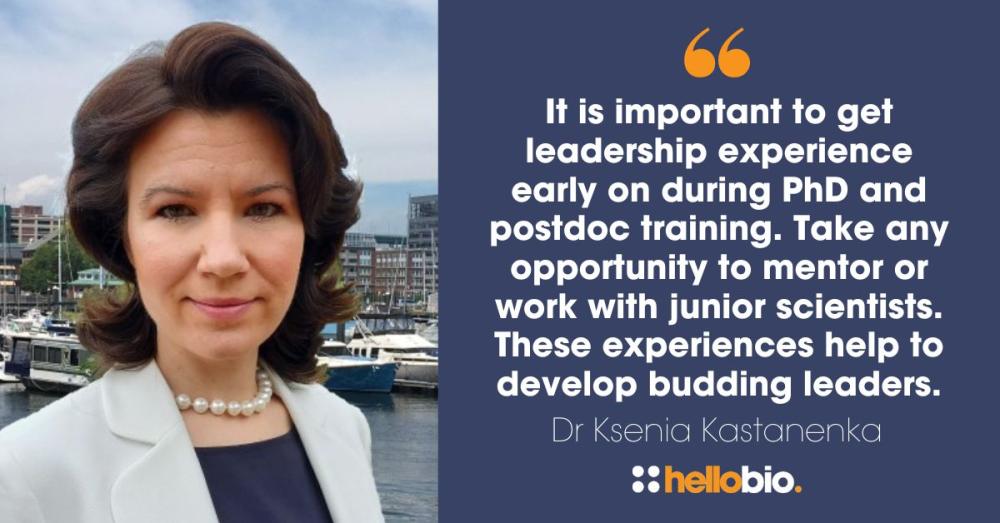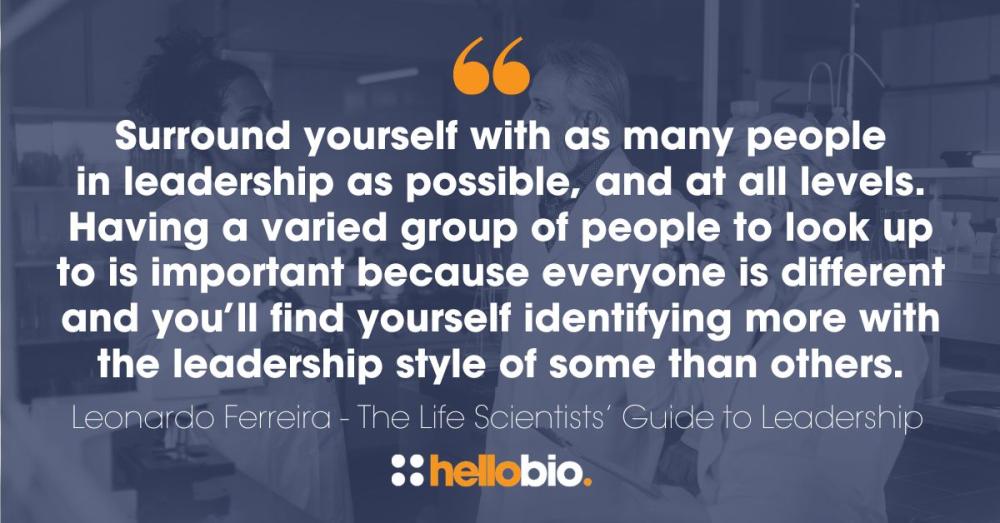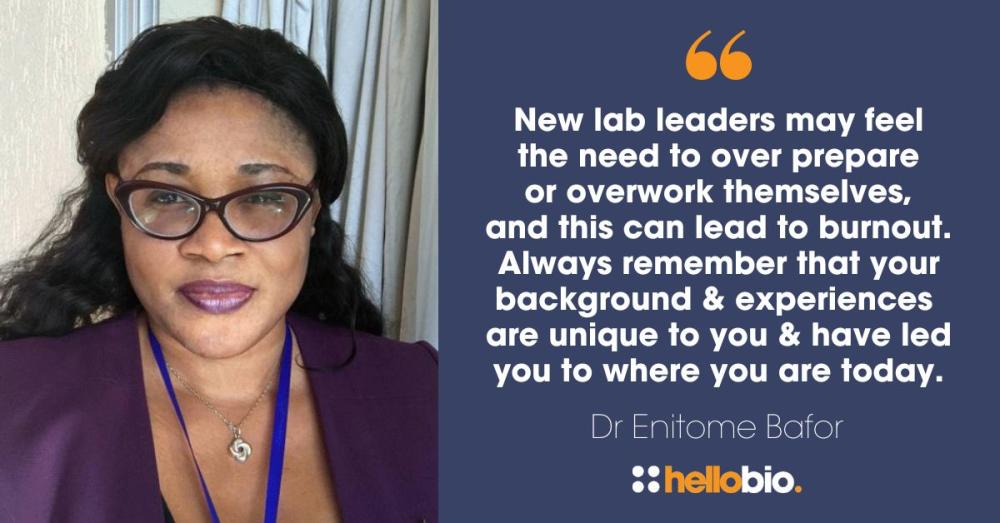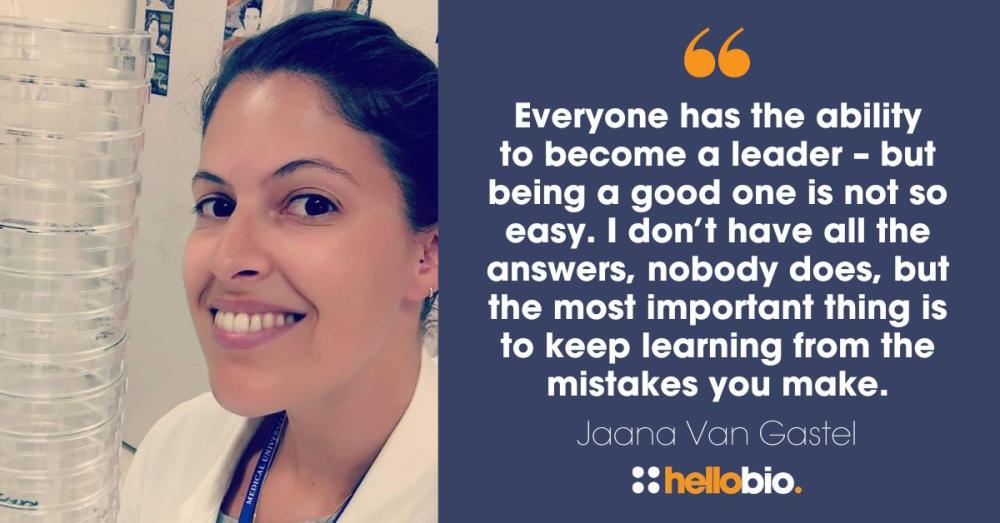The Life Scientists’ Guide to Leadership
Becoming a lab leader is a long-term goal for many life science professionals and part of a natural career progression in STEM. Many early career researchers will have aspirations to work their way through the ranks to management positions and beyond some day. Yet no matter how successful a scientist might be at the bench, not every researcher will consider themselves to have ‘natural’ leadership skills.
Leading a team in any field of STEM requires particular attributes that are sometimes overlooked in the early stages of a science career, yet are vital for success in a leadership role. Recruiting and managing the right people, building and maintaining team morale, and dealing with potential conflict are all essential skills for the creation of a strong, productive and happy team. However, these attributes don’t come naturally to all, and that’s why it’s important to start developing leadership skills early in your career if you have ambitions to climb the management ladder.
In this guide, we speak to a number of professional lab leaders from around the world who share their thoughts on leadership, the challenges their roles entail, and the qualities they deem most important for the smooth running of a successful science lab. We also look at different types of leadership styles, and consider the steps an established leader can take to maintain and develop their skills. Take a look at our Life Scientists’ Guide to Leadership!
Learning to lead
Becoming an effective leader in STEM takes work and commitment as well as some essential skills that must be developed in order to lead a team. For those with good people skills, confidence in their ability to communicate, and a talent for visualising and implementing both short-term and long-term goals, leading a team may feel completely natural to them. For others, leadership skills must be learned and developed over time, and this can be done through dedicated training courses, as well as learning from mentors and other senior staff within your lab.
Dr Leonardo Ferreira, an Assistant Professor at the Medical University of South Carolina, shared his thoughts on ‘natural’ vs ‘learned’ leadership skills. He told us: “Being an effective leader in STEM requires both a natural inclination and ability, as well as learning from others. How much of each will vary from person to person. Some people are naturals at making themselves heard, getting people excited about their work and helping them to realize their vision. Other people not so much! Remember that these qualities do not necessarily correlate with how solid or how transformative their actual science is, and learning from others in STEM is always a lifelong endeavor.”
What does a lab leader do?
Strong leaders and managers are essential in every type of professional industry, and there are many responsibilities common to all types of management roles. Here we consider some of the tasks expected of a science lab leader, as well as looking at additional considerations which might set a STEM leader apart from those in other academic fields.
Common tasks & duties of a lab leader
The role of a lab leader is multifaceted and will vary depending on level and type of institution (eg. university, private research institute, or industry sector). However there are a number of common duties that would be expected of most scientists in a leadership role, which could include the following:
Research-based tasks
- Designing experiments, developing research methodologies and drafting proposals
- Supervising and troubleshooting lab experiments
- Ensuring protocols and regulations are followed
- Analysing data and interpreting results
- Setting short and long-term research goals
Writing tasks
- Preparing manuscripts for publication in scientific journals
- Contributing to academic books
- Responding to requests for content from media or news outlets
Team building
- Advertising and interviewing for lab vacancies
- Selecting and hiring new team members of all levels
- Recruiting and supervising students and interns
- Organising and leading lab meetings to discuss plans, progress and problems
- Maintaining team motivation and morale
People management
- Assigning and delegating tasks to team members
- Dealing with conflict between team members
- Carrying out disciplinary procedures where necessary
- Facilitating and overseeing collaborations with researchers from other labs
Financial responsibilities
- Overseeing the lab budget and ensuring resources are used efficiently
- Managing and allocating funding to different groups
- Writing and managing research grants
Teaching responsibilities
- Developing and delivering courses and lectures
- Leading seminars, workshops and small teaching groups
- Offering career advice to students and early career researchers
- Acting as a mentor to team members
As well as the tasks listed above, a lab leader may also be responsible for ordering new materials, managing lab supplies and ensuring that equipment is properly maintained. They might also be expected to attend and speak at science conferences, and to stay on top of the latest scientific advancements in their field.
We asked Dr Leonardo Ferreira to share other ways in which leadership in science differs from leadership in other academic or professional areas. He told us: “Science is inherently hard and unpredictable, and is bound to the physical world. Effective leadership in STEM has to be more horizontal, more dynamic, more iterative than in other fields. Ideally, people should feel as though they are working as part of a team for the greater good, not just for their manager or advisor. Science is an all-absorbing endeavor and leadership in science should take the form of suggestions and directions, rather than orders and directives.”
Taking on new challenges
The role of lab leader is an important one which will come with new challenges you may not have faced before. Gaining as much leadership experience as you can in advance of accepting a position is vital for a smooth transition into a more senior role.
Dr Ksenia Kastenenka, an Assistant Professor at the Massachusetts General Hospital and Harvard Medical School, USA, reinforced the importance of gaining leadership experience at PhD or postdoc level. She said: “One of the major challenges is not being prepared to lead due to lack of formal leadership education for scientists. To overcome this challenge it requires a shift in mindset. When you are a postdoc, you are the one generating data and publishing papers. However, when you lead a research group, it is now all about them. The emphasis changes and a leader must shift their mindset to focus on how they can facilitate the progress of their team. It is important to get leadership experience early on during PhD and postdoc training. I would recommend jumping on any opportunities to mentor or work with junior scientists, such as a summer student, research technician, or a junior PhD student. These experiences help to develop budding leaders.”
What ‘type’ of leader are you?
There are numerous different ways to lead a team and several distinct styles of leadership. Your own personal style will very much depend on your personality and the way in which you communicate. Here are some of the most common approaches to managing a team:
Participative leadership (democratic) - Democratic leaders are recognised by their willingness to listen to the opinions of all team members and allow for group debates when making decisions. This style of leadership helps all team members to feel valued and appreciated, builds trust and boosts retention.
Authoritarian leadership (autocratic) - The opposite style to participative leadership, an autocratic leader will make most decisions themselves without much or any input from their team. Although this approach may leave team members feeling that their opinions are not valued or trusted, autocratic leaders are respected for their confident decision-making and ability to react quickly in a crisis.
Delegative leadership (laissez-faire) - A laissez-faire leader will give autonomy and creative freedom to their team members, allowing them to make their own decisions and even set their own work schedules. This can be effective for colleagues who are confident with managing their own time and workloads, but problematic for those who require more support and guidance.
Transactional leadership (managerial) - A managerial style of leadership relies on rigid rules and systems which team members are expected to follow in order to gain rewards, or otherwise face penalties. When team members are comfortable with this level of control it can be a highly productive leadership style. However, resentment can build when autonomy, creativity and ingenuity are suppressed in this way.
Transformational leadership (visionary) - A visionary leader will encourage team members to see the bigger picture, and will motivate them through praise, empathy and enthusiasm. An empowering style of leadership can be productive and generate loyalty, however it can sometimes also be seen as a ‘soft’ or ‘insincere’ approach.
Dr Leonardo Ferreira explained how surrounding yourself with people who have a wide variety of different leadership styles is a great way to begin to develop and understand your own style. He said: “Surround yourself with as many people in leadership as possible, and at all levels. Having a varied group of people to look up to is important because everyone is different and you might find yourself identifying more with the leadership style of some people than others. You will have to encounter people with different personalities, goals, motivation levels, as well as face different logistic and scientific challenges in order to develop your own leadership style.”
Which skills do you need to lead?
If you’ve set your heart on becoming a lab leader some day, which are the most important skills you need in order to reach your goal? We asked four established leaders about the qualities they rely on most in the lab, and the skills they consider essential in order to keep their labs running smoothly and harmoniously:
Martina Semenzato - senior postdoc at the Venetian Institute of Molecular Medicine, Italy
“The most important quality is to be able to communicate with other lab members, especially when important decisions have to be taken or problems need to be solved. Being open-minded is vital, since everybody in the lab can have a different point of view that could be useful to the others.”
Dinesh Babu - senior postdoc at the University of Alberta, Canada
“In my opinion, time management is the first and foremost important quality for a good ‘Lab Leader’, which I am still adapting to learn! In addition to work-life balance, I feel the balance of focus and productivity between our core projects and other peers’ projects seems to be very crucial as this decides our task management. Secondly, interpersonal skills are essential as we meet people and can face challenges of a diverse nature, where each of them needs to be approached and handled differently. Lastly, team spirit, whether we work for ourselves or our peers, ultimately, we are going to win as a team, and thus a good leader should have a spirit of ‘oneness’.”
Caroline Manicam - PI at the University Medical Centre of Johannes Gutenberg University Mainz
“In my current position as a group leader, I consciously endeavour to promote change in the lab. I am a strong proponent for leading by example, building trust through transparency, inspiring in kindness and most importantly, valuing diversity in a team.”
Leonardo Ferreira - Assistant Professor at the Medical University of South Carolina, USA
“A scientific leader must have a vision. Science takes time and is made of more failures than successes, so it is key to have a vision, to know what it's all for. They must lead by example, and should not expect the trainees to be more motivated or work harder than they do. This helps create a sense of community, of camaraderie, of understanding that the whole is more than the sum of the parts. A scientific leader must also be trustworthy. Trainees put a significant portion of their future in their advisor's hands by working in their laboratory, learning from their guidance, and relying on their references and recommendation letters in the future.”
The importance of empathy & optimism
For scientists to achieve success in their chosen fields they will almost certainly have to deal with a huge amount of failure along the way. Science research requires a great deal of resilience, and the job of a lab leader is to keep their team motivated and excited by the work they are doing.
Having empathy for colleagues when times are tough and being able to remain optimistic when results aren’t going their way are valuable qualities for any lab leader. Dr Ksenia Kastenenka reinforces this point: “It is very important to be able to put yourself in the shoes of your mentees and understand where they are coming from. Empathy is essential to help you understand how as a leader you can support your team members to achieve the success they are capable of. In the field of science, we are constantly pushing the boundaries, breaking new ground and testing novel hypotheses. With that comes a lot of failure, so it’s also very important as a leader to maintain positive energy and optimism for your team and yourself.”
Managing people & dealing with conflict
One of the areas new leaders are often least experienced in is the management of people. Leading teams of staff from different backgrounds and with individual personalities is not easy and takes patience, good communication skills and an open-minded approach.
At this year’s Hello Bio LabLife Conference we hosted an online panel discussion on leadership and communication, and some of the topics covered included conflict resolution, micromanagement and the value of open communication. You can watch the full discussion on our YouTube channel here: Effective Leadership & Communication in the Lab
You can also read the associated blog on Conflict Resolution: Practical Tips for STEM Leaders which features valuable advice from Professor Stuart Maudsley of the University of Antwerp, Sarah Gruneisen of Avagasso Coaching, and Elizabeth Berry of the New York Medical College.
Overcoming imposter syndrome
Another common challenge for science professionals at any level is overcoming imposter syndrome. Feeling that you are a fraud, or that you do not deserve the success you have achieved can be especially prevalent when starting a new job role. Imposter syndrome can impact on mental health and add to existing levels of stress and anxiety for lab leaders.
Dr Enitome Bafor of the National Cancer Institute, USA, shared her experiences of imposter syndrome in leadership, and told us how she learned to overcome the issue. She said: “New lab leaders may often experience self-doubt, which causes them to question their abilities and judgement. This can lead to a fear of failure, resulting in them becoming overly cautious or indecisive. New lab leaders may feel a need to over prepare or overwork themselves, and ultimately, burnout occurs. As someone who has dealt with imposter syndrome, my suggestion for dealing with the problem is first to recognize and acknowledge that it is happening and then talk with trusted mentors or friends. I highly recommend challenging negative self-talk and reframing your thoughts to be more positive and realistic. Reflect on your skills, your achievements, and successes, and write these down as it will improve your self-worth. Always remember that your background and experiences are unique to you and have led you to where you are today. Your experiences, no matter how different they may seem, equip you with exceptional skills that you bring to your leadership role.”
For more advice on imposter syndrome, take a look at these great guest articles on the Hello Bio blog:
- “I can’t believe they’re letting me write this blog”: Imposter Syndrome, Science, and the Rest of the World - by Brittany Berdy
- Failure, Resiliency and Overcoming Imposter Syndrome - by Dr Matthew Caley
- How to Manage Stress & Anxiety in the Lab - by Dr Noelia D Falcon
Moving forward as a leader
Becoming a lab leader is a huge achievement for any scientist, but the hard work doesn’t stop once you’ve reached that important career milestone. An effective leader will constantly be looking to develop and improve upon their existing skills in order to stay on top of their game and keep their team motivated and inspired.
Dr Enitome Bafor told us about the importance of continually developing your leadership skills in STEM. She said: “Continuous learning is of utmost importance for leaders. STEM leaders should regularly reflect on their leadership skills and areas that require development. Continuous learning enables leaders to develop new skills and strategies, explore new ideas, and drive innovation and change. It also demonstrates a commitment to excellence, which enhances a leader's credibility and expertise. Science leaders can set a powerful example and encourage their team members to embrace lifelong learning.”
Embracing feedback
Listening to and accepting feedback as a leader isn’t always easy, but it’s essential for developing and maintaining trust and confidence in the people you are leading. Learn from your team members and be prepared to adapt your leadership style if it’s not working for everybody.
Leonardo Ferraira explains how embracing feedback from team members when they move on from the lab is essential for personal growth as a leader. He said: “Seeking feedback as a lab leader is extremely important. An academic lab is rarely someone's last work destination. Undergrads and technicians will go on to PhD programs or medical school. PhD students will go on to postdocs or industry. Postdocs may go on to become faculty themselves, so how good a leader is can be measured by how well their trainees do after they leave their laboratory. Only by seeking constant feedback can a leader become better at helping people get where they want to go, while also helping the leader fulfil their own vision . People work best when they feel supported and have a sense of ownership of their project and know that they are building their own futures, not just their advisor's future.
Ksenia Kastanenka reminds us of the importance of creating a working environment where your team feels comfortable giving feedback and expressing concerns. She said: “Seeking feedback from the team is very important, however, it can be challenging for both parties. The field of academic research is hierarchical, and it can feel intimidating for some trainees to provide feedback to their leader. It’s the job of the lab leader to establish trust and provide the right environment where mentees can voice their concerns.”
The bigger picture
In conclusion, becoming a leader in STEM is a big challenge that comes with a lot of responsibilities. There are numerous skills you can develop to help you reach a leadership position, and the sooner you start to work on those skills, the better chances you will have when an opportunity comes your way.
Seeing the bigger picture is one of the most important aspects of leadership, especially in science research where the goals of a team are almost always shared. Letting your lab members know that you are pulling in the same direction and working towards the same long-term goals will foster trust and respect which will ultimately help team morale and productivity.
And finally, showing your human side is essential for positive leadership. You’ll never have all the answers, and for science researchers this is an important lesson to learn at any stage of your career. Setting a positive example of honesty, openness and the ability to learn from your mistakes will strengthen your team in the long-term.
In a guest blog on strength in leadership, Jaana van Gastel told us why vulnerability doesn’t have to be a weakness in science. She said: “I tried to pretend to be all-knowing and immune to stress, but I found that students responded better when they realized that I too, was only human. Everyone has the ability to become a leader – but being a good one is not so easy. I don’t have all the answers, nobody really does, but the most important thing is to keep learning from the mistakes you make. It is perfectly acceptable not to have all the answers… even as a leader it is important to own up to that, and let everyone see it.”
More about leadership on the Hello Bio blog
For more thoughts on leadership and mentoring in STEM, check out some of these great articles on the Hello Bio blog:
- Setting up a New Lab: Overcoming Challenges & Celebrating Success - guest blog by Dr Leonardo Ferreira
- Why Strong Leadership is Vital for Great Science - guest blog by Jaana van Gastel
- The Importance of Mentoring in Science & Tips for New Mentors - guest blog by Maria Valesco
- Why Scientists Need Great Mentors - guest blog by Stuart Maudsley
- Podcasts by Scientists: The Lead Candidate - spotlight on Simona Carbone's podcast
- Becoming an Assistant Professor - Advice for Science Postdocs
- Conflict Resolution: Practical Tips for STEM Leaders
________________________________
If you enjoyed this article, why not check out the other resources available on our blog. We are passionate about supporting life scientists including early career life scientists and PhD students - with really low-priced reagents, antibodies and biochemicals, early career scientist grants, and resources to help with both personal and professional development. We know how tough it is - so we hope you find these helpful!
More General Support for Life Scientists
For advice on wellbeing, dissertations, presenting at conferences, wellbeing, PhD support, networking and lots more, we have a huge range of articles to help - just click below:
Save up to 50% on our high purity reagents...
When you get to the stage of planning your experiments, don't forget that we offer a range of low-cost, high-purity agonists, antagonists, inhibitors, activators, antibodies and fluorescent tools (yes - they really are around half the price of other suppliers!) You can use our Quick Multi-Search Tool to search for lots of products in one go, and the range includes:
- Enzyme inhibitors and activators
- Chemogenetic ligands
- Ion channel modulators
- GPCR & ionotropic receptor ligands
- Cell biology reagents & biochemicals
Technical resources
Try our Molarity Calculator: a quick and easy way to calculate the mass, volume or concentration required for making a solution.
Try our Dilution Calculator: an easy way to work out how to dilute stock solutions of known concentrations
We also offer a comprehensive range of technical resources including antibody protocols and methods, product guides and mini-reviews:
And finally, don't forget to check back in with our blog regularly for our latest articles. If there’s something you’d love to contribute to the community, whether that’s an interview or article, drop us a line at hello@hellobio.com
---






